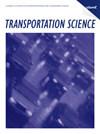Robust Charging Network Planning for Metropolitan Taxi Fleets
IF 4.8
2区 工程技术
Q1 OPERATIONS RESEARCH & MANAGEMENT SCIENCE
引用次数: 0
Abstract
We study the robust charging station location problem for a large-scale commercial taxi fleet. Vehicles within the fleet coordinate on charging operations but not on customer acquisition. We decide on a set of charging stations to open to ensure operational feasibility. To make this decision, we propose a novel solution method situated between the location routing problems with intraroute facilities and flow refueling location problems. Additionally, we introduce a problem variant that makes a station sizing decision. Using our exact approach, charging stations for a robust operation of citywide taxi fleets can be planned. We develop a deterministic core problem employing a cutting plane method for the strategic problem and a branch-and-price decomposition for the operational problem. We embed this problem into a robust solution framework based on adversarial sampling, which allows for planner-selectable risk tolerance. We solve instances derived from real-world data of the metropolitan area of Munich containing 1,000 vehicles and 60 potential charging station locations. Our investigation of the sensitivity of technological developments shows that increasing battery capacities shows a more favorable impact on vehicle feasibility of up to 10 percentage points compared with increasing charging speeds. Allowing for depot charging dominates both of these options. Finally, we show that allowing just 1% of operational infeasibility risk lowers infrastructure costs by 20%.Funding: This work was partially funded by the Deutsche Forschungsgemeinschaft [Project 277991500].Supplemental Material: The online appendix is available at https://doi.org/10.1287/trsc.2022.0207 .大都市出租车队的稳健充电网络规划
我们研究了大规模商业出租车队的稳健充电站位置问题。车队中的车辆在充电操作上相互协调,但在客户获取上并不协调。我们决定开设一组充电站,以确保运营的可行性。为了做出这样的决定,我们提出了一种介于路线内设施位置路由问题和流动加油位置问题之间的新型求解方法。此外,我们还引入了一个问题变体,以做出充电站规模决策。利用我们的精确方法,可以为全市出租车队的稳健运营规划充电站。我们开发了一个确定性核心问题,在战略问题上采用切割平面法,在运营问题上采用分支-价格分解法。我们将这一问题嵌入到基于对抗抽样的稳健解决方案框架中,该框架允许规划者选择风险容忍度。我们解决的实例来自慕尼黑大都市区的真实数据,其中包含 1,000 辆汽车和 60 个潜在充电站位置。我们对技术发展敏感性的研究表明,与提高充电速度相比,增加电池容量对车辆可行性的影响更大,最多可达 10 个百分点。允许车厂充电在这两种方案中都占主导地位。最后,我们表明,只要允许 1%的运营不可行性风险,就能将基础设施成本降低 20%:本研究部分经费来自德国科学基金会 [项目 277991500]:在线附录见 https://doi.org/10.1287/trsc.2022.0207 。
本文章由计算机程序翻译,如有差异,请以英文原文为准。
求助全文
约1分钟内获得全文
求助全文
来源期刊

Transportation Science
工程技术-运筹学与管理科学
CiteScore
8.30
自引率
10.90%
发文量
111
审稿时长
12 months
期刊介绍:
Transportation Science, published quarterly by INFORMS, is the flagship journal of the Transportation Science and Logistics Society of INFORMS. As the foremost scientific journal in the cross-disciplinary operational research field of transportation analysis, Transportation Science publishes high-quality original contributions and surveys on phenomena associated with all modes of transportation, present and prospective, including mainly all levels of planning, design, economic, operational, and social aspects. Transportation Science focuses primarily on fundamental theories, coupled with observational and experimental studies of transportation and logistics phenomena and processes, mathematical models, advanced methodologies and novel applications in transportation and logistics systems analysis, planning and design. The journal covers a broad range of topics that include vehicular and human traffic flow theories, models and their application to traffic operations and management, strategic, tactical, and operational planning of transportation and logistics systems; performance analysis methods and system design and optimization; theories and analysis methods for network and spatial activity interaction, equilibrium and dynamics; economics of transportation system supply and evaluation; methodologies for analysis of transportation user behavior and the demand for transportation and logistics services.
Transportation Science is international in scope, with editors from nations around the globe. The editorial board reflects the diverse interdisciplinary interests of the transportation science and logistics community, with members that hold primary affiliations in engineering (civil, industrial, and aeronautical), physics, economics, applied mathematics, and business.
 求助内容:
求助内容: 应助结果提醒方式:
应助结果提醒方式:


